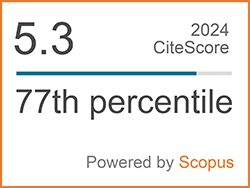Effect of Borax-Boric Acid Treatment on Fire Resistance, Thermal Stability, Acoustic, and Mechanical Properties of Mycelium Bio Composites
Abstract
Mycelium biocomposite materials have been established as a sustainable alternative to polystyrene in single use applications like packaging. However only little investigations are done on improving their resistance to fire and heat, which can find use in newer applications. This paper focuses on the development and characterization of a mycelium-based sawdust-coir pith biocomposite material treated with a combination of fire-retardant compounds (borax and boric acid). The outcomes of fire resistance tests, such as flammability, flame penetration and rate of burning demonstrated a significant improvement in values with respect to untreated samples. However, samples having 30% boron compounds by weight in it exhibited the best fire resistance properties. The thermal analysis of treated samples indicated that the presence of fire-retardant chemicals has not significantly affected their thermal stability. The glass transition temperature (Tg) of treated mycelium composite material was found to be 212.75 °C against a value of 207.78 °C for untreated samples. The fire retardant treated mycelium composite samples having 30% boron by weight in it, exhibited an average sound absorption coefficient of 0.38 compared with a sound absorption coefficient of 0.29 for polyurethane foam. The prepared mycelium biocomposite has a self-extinguishing nature and exceptional fire resistance capabilities with an LOI value of 50%. The mechanical testing revealed that the presence of fire-retardant chemicals has significantly improved the flexural properties. However, only a marginal increase was visible in the compression strength of mycelium biocomposites.
Keywords
DOI: 10.14416/j.asep.2023.11.007
Refbacks
- There are currently no refbacks.
 Applied Science and Engineering Progress
Applied Science and Engineering Progress







